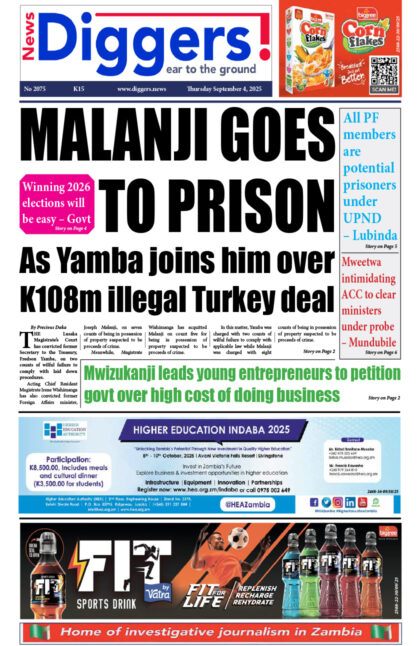FORMER Finance Minister Dr Situmbeko Musokotwane says excessive borrowing by the PF has led to the collapse in the value of the Kwacha over the past 10 years.
And Dr Musokotwane says government’s attempt to assure Zambians that the current strengthening of the Kwacha is genuine and sustainable should be rejected.
In response to a press query, Dr Musokotwane, who is also UPND chairman for economics, said the PF government had not implemented any economic plan which could lead to sustainable gain in value of the kwacha against foreign currencies.
“The PF government has neither developed nor implemented any economic plan that can lead to sustainable gain in value of the Kwacha against foreign currencies like the US dollar. The primary factor that has over the past ten years led to the collapse in the value of the Kwacha during the PF rule is excessive borrowing by the government. The repayment of external loans has drained the foreign exchange resources of the country. The trend has been that dollars from copper exports come into the country but then flow out immediately to pay loans. This causes scarcity in foreign exchange leading to the dollar getting expensive,” Dr Musokotwane said.
“Other factors like disruption caused by COVID-19 are acknowledged but they are far less in extent compared to the effects of heavy debt servicing. The government’s attempt to assure us that the current strengthening by the Kwacha is genuine and sustainable must be rejected. The citizens must first be told whether or not the debt overhang the country suffers from has been resolved. Without the resolution, there is no assurance about stability because foreign exchange shall continue to leave in excessive amounts.”
Dr Musokotwane noted that most of the factors leading to the present strengthening of the Kwacha could not be considered to be sustainable as long as the debt problem remained unresolved.
He added that 2022 would be a challenging year as the country would be expected to pay $750 million to clear the first Euro Bond payment, in addition to the regular payments of interests on existing loans.
“The debt overhang problem still remains with us to this day even as the Kwacha has strengthened during the past few days. In particular, the year 2022 will be extremely challenging. It will probably be the worst challenge since independence. In addition to the regular payments for interest on our loans – which the country was already struggling or failing to pay in the past years – a whopping $750 million must also be paid next year to clear the first euro bond that was issued,” Dr Musokotwane said.
“No one knows where Zambia will find the money to pay. Surely this will mount the severest pressure on the exchange rate unless the government finds a way to deal with creditors. But it is this very necessity of reaching agreement with creditors which PF has failed to achieve to this day from about two years ago. Most of the factors leading to the present strengthening of the dollar cannot be considered to be sustainable as long as the debt problem remains unresolved.”
Dr Musokotwane said one of the reasons why the Kwacha had appreciated was because government had suspended the servicing of some of its debt.
“We are told that one reason the Kwacha has gained in strength is because the government, yet again, has borrowed millions of US dollars. These funds were then sold on the market, thereby making the Kwacha to gain value. Borrowing dollars to make our currency stronger is not sustainable because we are actually increasing the future outflow of dollars in debt servicing. Another reason for the strengthening of the Kwacha is that the government has suspended the servicing of some of its debt. In some cases, this is with the permission of the creditors. In many cases, it is a unilateral decision made by the government alone,” he said.
“The act of not servicing the debt improves the supply of foreign exchange within Zambia. However, this cannot be so forever because sooner or later servicing of debt must resume, thereby once again putting pressure on the exchange rate. Finally, the Kwacha exchange rate is said to have improved because taxes paid by mining companies have risen in tandem with higher prices for copper on the world markets. That notwithstanding, the exchange rate will not appreciate as long as the debt problem is unresolved. The debt problem is just too big compared to the present and expected future improved tax inflows.”
Meanwhile, Dr Musokotwane stated that the excessive debt had also caused the escalating rise in the cost of living.
“In conclusion, it is deceptive to hope that the Kwacha exchange will stabilise or even appreciate on a sustainable level soon. It will not happen as long as the problem of excessive debt remains unresolved. The appreciation that we have observed so far is largely artificial, caused by government borrowing dollars and selling them on the market,’’ said Dr Musokotwane.
“For 10 years, the government was being warned about the severe consequences of excessive debt. It is this debt that has caused the escalating rise in the cost of living that we are experiencing now. Panic measures to improve the strength of the Kwacha while doing nothing to address the real cause of the crisis is of course merely to deceive voters ahead of the election that the government has a solution.”
























